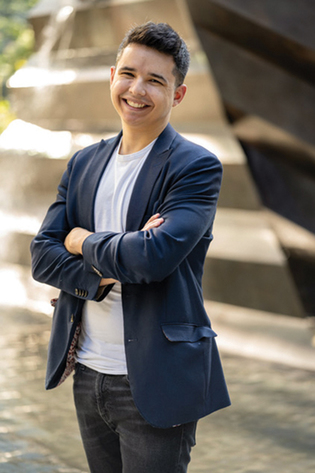 loading
loading
From the EditorAn alum changes courseBen Bartolome '16 is making financial advice accessible.  Ben Bartolome ’16. View full imageSometimes, things turn out perfectly, even when you’re late. The Yale Alumni Association always invites the editor-in-chief of this magazine to a yearly gathering of some of the most dedicated volunteer Yalies: the YAA’s Board of Governors, who work on everything from aiding Yale clubs and communities to furthering equity and inclusion for all. The morning starts with breakfast and chatting, and then everyone strolls into the main hall. This year (and there’ve been other years), the editor-in-chief (me) arrived too late for breakfast. Most of the tables in the room were already filled. I found a chair, sat down, and apologized for blocking the view of the young man sitting behind me. He said he could see just fine. At one point in the meeting, we were asked to join with a partner and converse. The cheerful young man behind me, Ben Bartolome ’16, smiled and said, “You’re my partner.” He asked about my interests, and I talked about the puzzles of editing and the elation of writing. Then I asked him some questions, and he told me about his work and an extraordinary decision he’d made. It was so interesting that, later, I interviewed him on Zoom. Ben had been a low-income student from New Orleans. He was the oldest child of four, born to and raised by Puerto Rican and Filipino parents, and he knew that “things were quite tight.” But thanks to an observant teacher, he applied to and was tested and accepted by a magnet school—one of just three students from an area of lower socioeconomic status. In high school, Ben would become salutatorian, though he admits he “was somewhat of a troublemaker.” He got into Yale through QuestBridge, which works to place high-achieving, low-income students in highly selective colleges. At the time, the minimum wage for students working at Yale was roughly $12.50; Ben earned more. But it was hard. “I worked many jobs while I was on campus, to send money back home to my parents. The salient statistic for that was that in my sophomore and junior years, I had more jobs than I had classes.” In his first year, Ben had been placed in Bingham Tower, on the highest floor, and “it just so happens that everyone who lived on that floor were all STEM majors.” (His hypothesis: the decisionmakers thought science students were too nerdy to turn the top floor into a party suite.) He is still best friends with all of them. During that year, and throughout his four years at Yale, he made it a mission to advocate for first-generation students, students underrepresented in STEM, and other groups that weren’t well noticed. And he met his future wife: Brooke Lamell ’16, now Brooke Bartolome ’16. He was researching chemical engineering on organic solar cells, and she was doing research in astrophysics, her eventual major. (Yes, there’s romance in science.) After college, he started earning money—very significant money, starting with a trading firm where he learned to work in finance, programming, and data analytics. Then he moved to the Navy Federal credit union, the world’s largest, and rose from data analyst to senior data analyst to data scientist and finally into machine learning. And then Ben did something that few people do: he decided to stop making large amounts of money and start helping people. Ben and two friends, Eric Anderson ’16 (double major in mechanical engineering and computer science) and Megan Valentine ’16 (computing and the arts), worked together to create a startup they call Walkthrough. “Walkthrough makes financial planning and wellness accessible to everyone who needs it,” Ben told me. “Traditional financial planning and advisory services are not accessible to most Americans. Something on the order of 70 percent of Americans wish they had financial planning—but can’t afford it. Most financial planners cost anything from $60 to $600 an hour.” Walkthrough runs on software. A client spends only $100 to connect their account securely to Walkthrough’s software, which then “goes through and does the analysis, looks at balances, interest rates, asset allocations, transactions, and so on, and then gives people their next financial move that makes sense in their situation—and the how and why, so they become increasingly financially literate over time.” Not many people in the world earning large amounts of money decide to change their focus and help others. But I have a feeling that Ben and his business partners will change many lives for the better.
The comment period has expired.
|
|